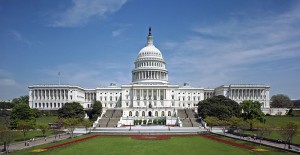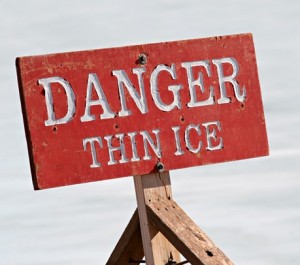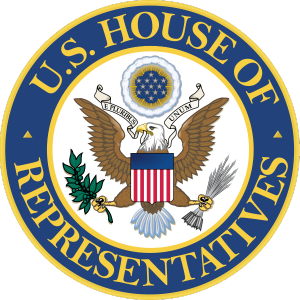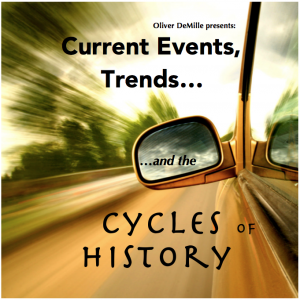Bigger Isn’t Always Better
February 13th, 2013 // 4:04 pm @ Oliver DeMille
 In the push for more gun control and changes to our national immigration policy, a few very important things have been mostly left out of the news in recent weeks.
In the push for more gun control and changes to our national immigration policy, a few very important things have been mostly left out of the news in recent weeks.
They have been mentioned, yes, but not emphasized.
And these items deserve to be seriously considered by all Americans.
- First, economic figures came out last week showing that the U.S. economy actually shrank during the last quarter of 2012—with negative growth in the U.S. GDP. The Administration waived this off as hardly newsworthy, a mere blip in many months of growth, but for those who closely watch the economy this is a serious concern. Recession hurts us all.
- Second, a poll last week showed that 53% of American citizens consider the federal government a threat in their lives.[i] This is very different from an approval rating. In fact, this is extreme. A majority of Americans now see Washington as a threat. This is a big deal, because a nation that doesn’t trust its government is going to become increasingly dysfunctional—and solutions are going to be more difficult in such an environment.
- Third, a new article argues that Congress and some federal Executive-Branch agencies are prone to political corruption[ii]—especially from well-funded special interest groups. The article concluded with concern that it is probably only wishful thinking to hope we can ever return to being governed according to clear, known, accepted principles instead of bureaucratic complexities. Government now is just too big.
- Fourth, as a corollary of item three, the complexity brought on by the sheer size of the federal apparatus has created the same level of bureaucratic technicality at the state and many local levels of government. Even our towns, cities and counties now tend to operate in the complicated style of federal agencies, where simplicity is suspect and byzantine rules apply to things that should be easy and straightforward. Locales are often funded from Washington and find that their otherwise uncomplicated systems must be complex in order to interface with federal offices and programs. The World Economic Forum ranked the United States 76th in free economic burdens on business growth.
- Fifth, many modern governments are now in the business of creating new “rights,” telling people that they need these “rights,” and then finding that the government can’t afford to fund these “rights.”[iii] This causes government to grow even more, in the desperate attempt to fund newly-established “rights” by consistently increasing taxes. Note that such “rights” aren’t inalienable, but rather established by governments. Among these “rights” are health care, unemployment income, and the pursuit of money for a growing number of consumer wants.
- Sixth, the U.S. infrastructure of roads, bridges, electric grids and drinking-water systems will cost $2 trillion to bring up to first-world standards.[iv] This at a time the government can hardly afford its current liabilities.
In short, government policies are slowing or reversing our economic growth, the people don’t trust their government, the government just keeps growing and growing, costs are increasing, and government is becoming increasingly complex and difficult to manage at all levels.
This same bundle of policies—along with massive involvement in foreign wars—brought down many of the empires of history, including the Roman, Ottoman and British.
Perhaps the six items outlined above haven’t led the news cycle simply because they aren’t really anything new.
Most regular Americans probably already knew about these trends—at least at a gut level—before they were officially announced.
Still, these are in many ways the big news of 2013.
This is the new environment in which we live, and all of these trends are making freedom less likely to flourish in the months, years and decade ahead.
Government is simply too big right now, and as it continues to increase in size many more such problems will naturally arise.
[i] See discussion on This Week with George Stephanopoulos, February 3, 2013.
[ii] Richard A. Epstein, “The Perilous Position of the Rule of Law and the Administrative State,” Harvard Journal of Law and Public Policy, Winter 2013, vol. 36, no. 1, pp. 5-19.
[iii] See, for example, ibid, pp. 10-12.
[iv] See Fareed Zakaria, “Can America Be Fixed?” Foreign Affairs, January/February 2013, p. 28.
***********************************
 Oliver DeMille is the chairman of the Center for Social Leadership and co-creator of Thomas Jefferson Education.
Oliver DeMille is the chairman of the Center for Social Leadership and co-creator of Thomas Jefferson Education.
He is the author of A Thomas Jefferson Education: Teaching a Generation of Leaders for the 21st Century, and The Coming Aristocracy: Education & the Future of Freedom.
Oliver is dedicated to promoting freedom through leadership education. He and his wife Rachel are raising their eight children in Cedar City, Utah.
Category : Blog &Current Events &Economics &Featured &Politics
Two Types of Republicans and Rising Socialism in America
January 29th, 2013 // 7:33 pm @ Oliver DeMille
The future of America depends on the House of Representatives.
If it goes along with the Obama Administration’s plans, we’ll see major changes in the next four years, and the move toward socialistic policies will be as momentous as the swing to the right under Ronald Reagan.
The White House and Senate are committed to this course, and only the House stands in the way of a serious socializing of America.
There are two types of Republicans in the House, and as long as they are split the White House will probably keep winning.
On the one hand, the Legislative Republicans believe in government.
They are conservative in the sense that they want the government to make good policy and live within its means, but they believe in government and in passing laws to effect change.
More to the point, the Legislative Republicans are against many of the Administration’s policies, and they believe in stopping the White House agenda by getting involved in the legislation and amending it to make it more conservative.
On the face, this may seem like a good viewpoint.
But these representatives have little support for their amendments. Democrats typically vote against such amendments, and so do the other Republicans.
Because of this, such a strategy routinely fails.
The Legislative Republicans don’t get their amendments passed, so they simply end up splitting the vote and allowing the White House to win.
The second type, the Limited Government Republicans, don’t believe in more legislation.
They want smaller government, major spending cuts and wise fiscal choices concerning entitlements.
They want tax reductions and a balanced budget, because they believe good fiscal policy leads to immediate and lasting improvements in the economy.
The White House wins whenever it splits the votes of these two branches of the GOP.
Legislative Republicans argue that the problem comes from the Small Government Republicans who don’t support amendments to White House proposals, amendments that would make the laws less hurtful to the economy.
These two camps show little likelihood of working together, and as a result the White House agenda keeps passing.
So who are the bad guys?
Those who try to work with the president but slow down his plans, or those who want to stop his agenda in its tracks?
In truth, the Legislative Republicans are living in a fantasy world.
Even if they were to gain the support of all Republicans in the House, they would amend various policies and pass them, only to see the White House bring more and more proposals that would undo the slowing effects of their amendments.
Those in the House who are standing strongly against big government policies are the hope of America.
We need the Legislative Republicans to join them.
It takes three presidential terms to really turn America around.
In third terms, two things happen: 1) policies really take hold, and 2) more Supreme Court appointments come.
For example, Reagan effectively got a third term by putting George Bush into office and continuing many of his main policies.
Clinton wasn’t able to do this because Al Gore lost in the 2000 election.
In the case of Barack Obama, there is a strong sense in the Administration that enough changes need to be made that real change occurs even if a third Democratic term doesn’t come.
President Obama is very popular personally, not so much for his policies but because of his person.
Republicans keep winning in Congress, for example. So the president may not have a third term Democratic follow-up after 2016.
 As long as the Republicans are split, the White House can keep pushing its agenda and promote two term’s worth of policies during the next four years.
As long as the Republicans are split, the White House can keep pushing its agenda and promote two term’s worth of policies during the next four years.
This seems to be their strategy.
The future of freedom right now depends on the House of Representatives, and it is time for the Legislative Republicans in the House to step back, realize what’s at stake, rethink their stance, and take a more direct stand for freedom.
Category : Blog &Current Events &Economics &Featured &Government &Leadership &Liberty &Politics
The 50 Steps of Crisis Eras
January 10th, 2013 // 9:23 am @ Oliver DeMille
Note to the Reader: I offered this list three years ago in early 2010, and since then the steps of crisis have advanced. I felt it was time to review and see where we are right now. Today I added a few words of commentary that update things since 2010—these are at the very end of this list. If you want, feel free to skip to the end and read the last paragraph before reading the list. It is amazing how closely we are following this! —Oliver
Part I: The 50 Steps of Crisis Eras
The steps below come in the following general order during the 20-25 years of Crisis Eras in history. This pattern repeats itself every 80 years or so, with the last crisis era occurring between 1922-1945. Within the phases, steps can come in any order. Our current crisis era began on September 11, 2001.
PHASE I
The Pre-Crisis Era (Usually 7-12 Years before the Crisis)
1. Foreign war (e.g. French and Indian, Mexican-American, WWI, Gulf War)
2. Major economic boom (e.g. the roaring twenties, the dot.com nineties boom)
3. Declining morals (both sexual and charitable)
4. Escapist entertainment (novels, the Charleston, the sitcom, etc.)
5. Salesman values are the norm: tolerance, niceness, wealth, etc.
6. Two-party conflict
7. Big institutions lose popular support (e.g. British Parliament 1780s, Congress 1860s, Presidency 1920s, courts 1990s).
PHASE II
The Catalyst and Its Aftermath
8. Major catalyst event changes everything (e.g. Boston tea party, Election of Lincoln, 1929 stock market crash, 9/11).
9. Society gears up for crisis, but nothing happens yet.
10. Return to seeming normalcy, but growing fear and mistrust.
11. Gold (and in modern times steel and oil) prices soar.
12. Realist entertainment
13. Growing racial and religious intolerance
14. Business failures and buy outs
15. Increased regulation of business
16. Many foreign conflicts
17. Many government scandals
18. Widely increased stress and health problems across the nation
19. Economic downturn — looks bad but bounces back for a while
20. Entrepreneurial values begin spreading: ingenuity, self-reliance, confidence
PHASE III
The Escalating Crisis (Steps 21-28 can occur in any order and at any point before step 35, but they do occur at some point during crisis eras.)
21. Big crisis event! (war, pandemic, natural disaster, depression, etc.)
22. All society’s problems suddenly combined into 1 big problem!
23. It feels like our civilization itself is at stake (it is!)
24. Statesmen either choose pessimism, fear, worry about the future, or they choose optimism and planning for after the crisis.
25. Major economic downturn, often at depression levels.
26. Major war begins.
27. One political party takes charge (for next decade or more).
28. Leaders either hunker down and try to survive the crisis, or they study hard, research deep, start or build businesses to fund freedom, and figure out answers for when the crisis is over.
29. Emphasis off rights and on duties (draft, tax hikes, censorship of media, etc.)
30. Customized becomes Mass (fewer brands at store, one or two office pay-scales and benefits package, etc.)
31. Leaders either focus on self survival or they write, teach, publish and spread ideas of freedom for after the crisis.
32. Warrior values dominate society: courage, strength, resiliency.
33. Every family sacrifices greatly.
34. Religious observance soars.
PHASE IV
The Turnaround (This is where things take a shift toward positive!)
35. Health increases, stress and anxiety decrease.
36. Greatness returns, because there is no other choice: greatness in homes, communities, nations, business, politics.
37. Leaders either trust that the government will just handle things after the crisis or they continue studying, teaching, writing and spreading the ideas that need to be adopted when the crisis ends.
38. The splintering, complexity and cynicism of the past 40 years turns to cooperation, spirituality and optimism. Happiness increases. (e.g. the number of people who considered themselves very happy decreased 60% from 1957 to 2007. 60%!).
39. Crisis ends! Everyone celebrates.
40. Masses go home, ignore societal progress and get back to life.
PHASE V
The Post-Crisis Era—Major Changes (Typically 0-12 Years After Crisis)
41. Leaders establish a new set of economic rules (with a mixture of regulation and free enterprise and a bias toward one of these).
42. Leaders establish a new culture (with government, corporations or family as the central institution).
43. Leaders establish a new social contract (with a mixture of government and private institutions such as schools, health care, insurance, technology, arts, etc.).
44. Leaders establish a new society (with decisions on the accepted mixtures of morals, pleasures and duties).
45. Leaders establish a new ideal view of rights (with mixtures of inalienable, civil and human rights).
46. Leaders establish a new definition of family.
47. Leaders define a new class (or classless) system.
48. Leaders establish new boundaries, allies and treaties.
49. Leaders establish new constitutional models and legal codes to embody steps 41-48 above.
[These choices can go very good for freedom, prosperity and happiness, or very poorly for these. It is up to the citizens and statesmen who influence and impact these decisions. While the decisions are made during the early post-crisis era, the leaders are prepared and the ideas promoted during the 20-25 year period of crisis.]
What’s next? Well, it could go either of two ways:
50a. If leaders are effective in their studying, learning and spreading freedom and free enterprise ideas during the crisis era, the society adopts free enterprise, family-centered culture. moral-based society, inalienable and equal civil and human rights, strong family values, no class or caste system, and a freedom-based form of constitution.
50b. If leaders aren’t effective in their studying, learning and spreading the principles of freedom during the crisis era and early post-crisis era, society adopts lots of regulation, governmental and corporate controls over the people, pleasure-based society, a loss of rights, aristocratic class systems and laws, and a force-based government.
Part II: Comments by Oliver DeMille
March, 2010
Almost a decade ago, 9/11 created event 8, and we watched events 9-13 occur during the Bush Administration. Then, since the major economic crisis and the election of President Obama we have watched events 14-18 occur.
This is happening very quickly. With the Health Care law, we will likely see 14-18 accelerate in the next couple of years before we have a chance to reverse things in a presidential election. The election will probably determine whether or not we progress quickly or slowly toward major crises.
January, 2013
We have witnessed a significant increase of events 14-18 since March 2010, and after the midterm elections of 2010 and huge gains by Republicans in the House of Representatives, we saw event 19 occur. In fact, it was strong enough that the nation re-elected President Obama in 2012.
After the election, we began witnessing event 20, partly as numerous businesses shut down to use resources in other ways or restructured in the face of increasing regulations, and also as a number of entrepreneurs saw the decline of free enterprise and got even more serious about growing their businesses—regardless of what government does.
We will see event 20 increase in 2013, and events 21-25 sometime very soon—likely before the 2016 election. Whether 21 or 25 will come first remains to be seen.
Are you ready for a current events master class?
Click the image for information on Oliver DeMille’s upcoming six-week seminar.
Early bird registration ends 1/17/13; class begins 1/22/13
Category : Blog &Culture &Current Events &Economics &Entrepreneurship &Family &Featured &Generations &History &Leadership &Liberty &Politics &Prosperity &Statesmanship
Why We Need a Third Party
November 17th, 2012 // 10:36 am @ Oliver DeMille
In the aftermath of the 2012 election, there have been numerous emails, posts, articles and blogs by business owners who say they are planning to sell or close their businesses, or just lay off enough workers that they can afford Obamacare for the employees who remain.
One summary listed the following announced layoffs—all attempts to deal with the new costs of Obamacare:
- Welch Allyn, 275 layoffs
- Stryker, 1170 layoffs
- Boston Scientific, between 1200 and 1400 layoffs
- Medtronic, 1000 layoffs
- Smith and Nephew, 770 layoffs
- Hill Rom, 200 layoffs
- Kinetic Concepts, 427 layoffs
- Coviden, 595 layoffs
- Abbot Labs, 427 layoffs
- St. June Medical, 300 layoffs
There are many, many others.
One email dated November 7, the day after the election, read:
“Time to sell our business. We can no longer afford to provide a living for 14 employees as soon we’re forced to pay for their healthcare. So sad, too bad. On to new ventures.”
After responses about how sad this is and others pointedly blaming the Obama Administration, the same person continued:
“We are all Americans and need to find common ground and make this country great together. I’m not mad at anyone for voting different than me. They love their president, don’t lose friends over calling him a dictator. I’m excited to sell our business. We are adventurous!”
That’s the entrepreneurial spirit that made America great.
Not: “Oh no, we’re losing our job. Will the government help us?”
But rather: “Hey, change happens. We’re excited. This is going to be an adventure!”
That’s the American spirit.
And while rumors abound about how much Obamacare will cost each small business and which won’t have to make any changes at all, there are a lot of employers right now who are very concerned.
Those with under 50 employees aren’t supposed to be hurt, but smaller employers are still worried about exactly how the new laws will be enforced.
Sadly, we will likely see a lot of change in small business in the months and years just ahead.
More regulation, higher taxes and drastically increased costs of employing people will make things more difficult.
An exception may be in network marketing companies or compensated communities.
I’ve long considered them among the top entrepreneurial opportunities in free nations, and with the current changes and policies this is even more true.
“My son is a doctor,” Marge said proudly.
“Wow,” Betty said with a concerned voice. “How is your son dealing with the new regulations coming into effect under Obamacare?” she asked.
Marge nodded and her face grew serious. “He’s very concerned, to tell the truth.”
“Fortunately, my son is building a huge network marketing company, and the regulations aren’t hurting him much,” Betty said. “Maybe your son would like to meet with mine about an opportunity?”
This kind of conversation is taking place a lot right now, and all indications are that it will increase.
Some parents are recommending that their college children put school on hold and start a network business, and I know two medical doctors who have gotten out of the profession in order to build networking businesses.
One of them talked two of his sons into quitting college and doing the same, though the three of them all ended up building networking organizations with entirely different companies.
II. The Party of Small Business
All of this got me thinking today, and as I pondered I realized something. Something big.
Something we really need right now in America.
We need a third party.
Actually, we need a new party that becomes more popular than the Republican Party and the Democratic Party.
There are more independents than members of either big party, so this shouldn’t be too much of a stretch.
Here’s the problem: The Democratic Party is now the unabashed party of big government, the welfare state, rule from Washington D.C., and everything that goes with these values.
The Republican Party touts itself as the party of freedom, limited government, free markets and business, but in fact it is the party of big business and a big-spending government at the same or just slightly lower levels than Democrats.
We have a party of Big Government (with big business as its co-pilot), and another party that emphasizes Big Business (with big government as its co-pilot).
The first is the Democratic Party, the second the GOP.
Neither is now effectively serving the needs of our nation.
As a result, we get bigger government regardless of who gets elected, and big business grows (to the frequent detriment of small businesses) regardless of who is in power in Washington.
In all of this, small businesses, families, communities and the middle class are the losers.
The solution? We need a party of small business.
We need a party whose top priority is the needs of families and small businesses.
This new party needs to reject the big-government and anti-free enterprise values of the Democrats and simultaneously the big-business and anti-immigrant attitudes of Republicans.
It needs to embrace toleration, diversity, reduced government regulations, lower taxes, decreased government spending, incentives for entrepreneurship, a charitable safety net, and incentives for more immigrants to bring their capital, businesses, labor and families to America.
It needs to get rid of the barriers to hiring (such as the increasing required health care costs) and drastically reduce government red tape for small businesses.
It needs to allow more innovation, shrink requirements on licenses and permits and other unnecessary costs that decrease entrepreneurship and growth, and create an environment of seamless partnerships between schools and businesses.
It needs to promote, encourage and incentive a lot more initiative, innovation and entrepreneurialism.
It also needs to push for more creative and independent thinking in the schools and less that is rote, conveyor-belt, and pre-scripted.
It should change the way schools are run, replacing an environment where administrators and bureaucrats feel comfortable to one led by proven innovators and others who have been successful in the real economy, the FOR-profit economy.
Forget teacher certification and unions—if we want to compete in the global economy we need innovators leading our classrooms.
As an example, principals and teachers should be hired who have excelled at implementing successful business plans rather than writing resumes.
And funding should flow to schools that excel in a true free market.
To ensure to that no child is left behind (for example in less-advantaged neighborhoods), even larger premiums should go to innovators who successfully turn dumpy schools into flourishing institutions whose graduates thrive.
The new party should apply similar principles to other kinds of organizations, from health care and community governments to every other sector of the economy.
Small businesses bring the large majority of growth in the economy, and the new party needs to begin with the specific needs of small businesses in mind.
It needs to identify things that hurt small business and repeal them, and find out what helps small businesses succeed and introduce more policies that encourage these things.
It needs to rewrite the commercial and legal code to create an environment where innovation is the norm, along with the values of growth, calculated risk, leadership, creativity, and entrepreneurialism.
It needs to be not the party of jobs, but the party of successful business ownership—and the jobs they naturally create.
III. A Bright Future?
We need a third party. The party of Big Government (with big business as co-pilot) and the party of Big Business (with big government as co-pilot) simply aren’t doing what our nation needs anymore.
It’s time for new thinking and new leadership.
There is an old saying that you can’t pour new wine into old bottles, because the residue of past wine always taints the new.
This is where we are in America.
The current parties, as much good as both have done at times, have peaked and are in decline.
New leadership is needed, along new values untainted by the baggage of two parties whose time has come and gone.
It is perhaps possible to reform one of the parties to get better results, but it is likely that only a new party with an entirely new focus and fresh thinking is going to take America where it needs to go.
Democratic nations are notorious for refusing to change until crisis forces their hand, and I suspect this is what we’ll witness in the 21st Century.
At some point, probably after major crisis and a superhuman American response, we’re going to need a new party.
Those who love freedom should start thinking about what it should look like.
One thing is clear: When it does come, it needs to be a party of small business.
Free enterprise and the entrepreneurial spirit made America great, and it will do so again if we let it.
Whatever comes in the economy, we want to be led by those whose attitude is, “It might sound bad, but this is an exciting adventure! Let’s get started…”
***********************************
 Oliver DeMille is the chairman of the Center for Social Leadership and co-creator of Thomas Jefferson Education.
Oliver DeMille is the chairman of the Center for Social Leadership and co-creator of Thomas Jefferson Education.
He is the author of A Thomas Jefferson Education: Teaching a Generation of Leaders for the 21st Century, and The Coming Aristocracy: Education & the Future of Freedom.
Oliver is dedicated to promoting freedom through leadership education. He and his wife Rachel are raising their eight children in Cedar City, Utah.
Category : Blog &Business &Citizenship &Community &Constitution &Culture &Current Events &Economics &Entrepreneurship &Family &Featured &Government &Independents &Leadership &Liberty &Mission &Politics &Producers &Prosperity &Statesmanship
AFTER THE ELECTION: The Year of Danger
November 8th, 2012 // 5:51 pm @ Oliver DeMille
The year ahead is a time of danger.
The election of 2012 is over, and you are either happy or upset with the outcome—or, like many independents, you are predictably frustrated with the whole system.
Whatever the case, the next few months is a time of real danger in our nation.
During elections, energy and citizen participation is high.
After elections, it reaches all-time lows. People of all political views tend to focus on other things and leave governance to the politicians.
America has serious challenges ahead, and many of them kick in right at the beginning of 2013.
Moreover, during the next year we will almost certainly determine whether or not the United States is going to fall off the looming financial cliff.
Concerns include:
- The rapidly growing debt
- The overwhelming reality of entitlements
- The growing deficit
- The weakening national credit rating
- The struggling role of the U.S. Dollar as the world’s reserve currency
- Various looming bubbles in the market
- A coming inflation crunch
- A further middle-class squeeze on jobs and discretionary income
- A tax rate that is driving more businesses abroad (or out of business)
- A very nervous small business community that is uncertain about growth or hiring
- Weak consumer demand that is causing businesses to produce less (and cut jobs)
- A rapidly expanding government sector that is threatening free enterprise
Washington needs to address these concerns quickly to relieve business anxiety that we’ll just see more of the same (or worse) from the government for the next four years.
After all, without the necessity of reelection the Obama Administration could be truly anti-business.
Hopefully, in contrast, President Obama will see this as an opportunity to really work with Republicans to fix these major national challenges.
The larger problem is that democratic societies seldom take action until they feel direct pain.
Indeed, democratic nations are notoriously bad at anticipating pain and taking action ahead of time, so they seldom stop crises but rather wait until it is too late to get serious about solutions.
We need real solutions in the months and year just ahead, and we can’t afford to wait for more crises.
We must immediately address the economic realities above (and others like them), at the very time the citizenry is the least likely to stay actively involved.
Whatever your political views, America needs you to stay enthusiastically engaged in watching and influencing government. Now more than ever.
Right now begins the year of danger in government and the future of the economy, and only the first branch of government—the people—can truly ensure that things go well.
The alternative is further major economic downturn.
***********************************
 Oliver DeMille is the chairman of the Center for Social Leadership and co-creator of Thomas Jefferson Education.
Oliver DeMille is the chairman of the Center for Social Leadership and co-creator of Thomas Jefferson Education.
He is the author of A Thomas Jefferson Education: Teaching a Generation of Leaders for the 21st Century, and The Coming Aristocracy: Education & the Future of Freedom.
Oliver is dedicated to promoting freedom through leadership education. He and his wife Rachel are raising their eight children in Cedar City, Utah.
Category : Blog &Citizenship &Current Events &Economics &Entrepreneurship &Featured &Government &Independents &Leadership &Liberty &Mission &Politics














